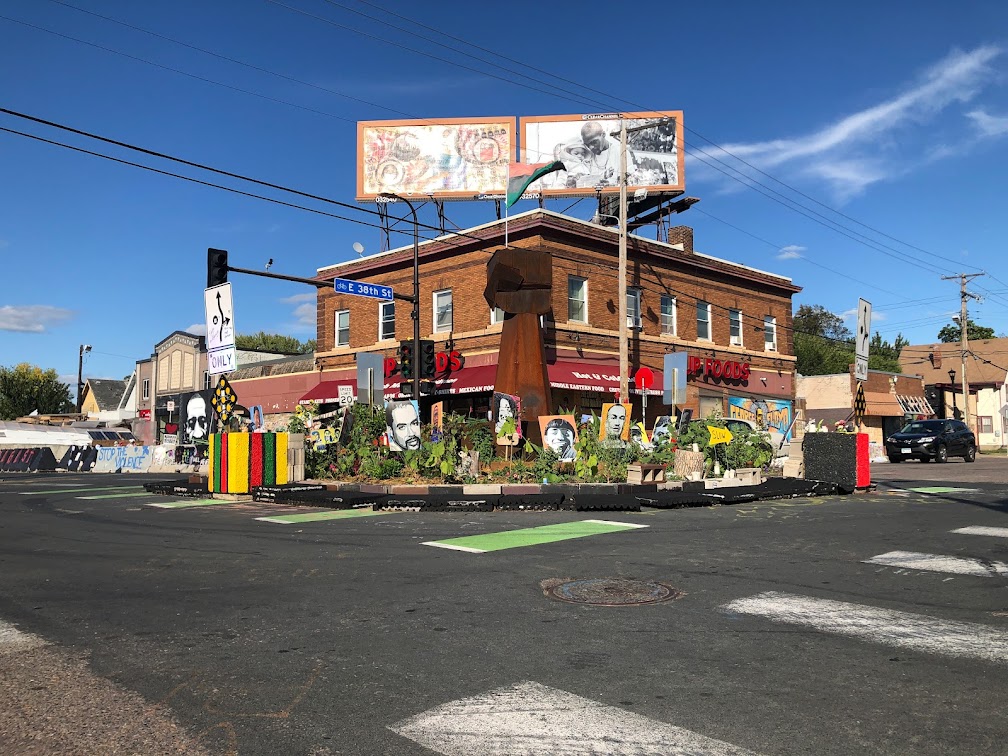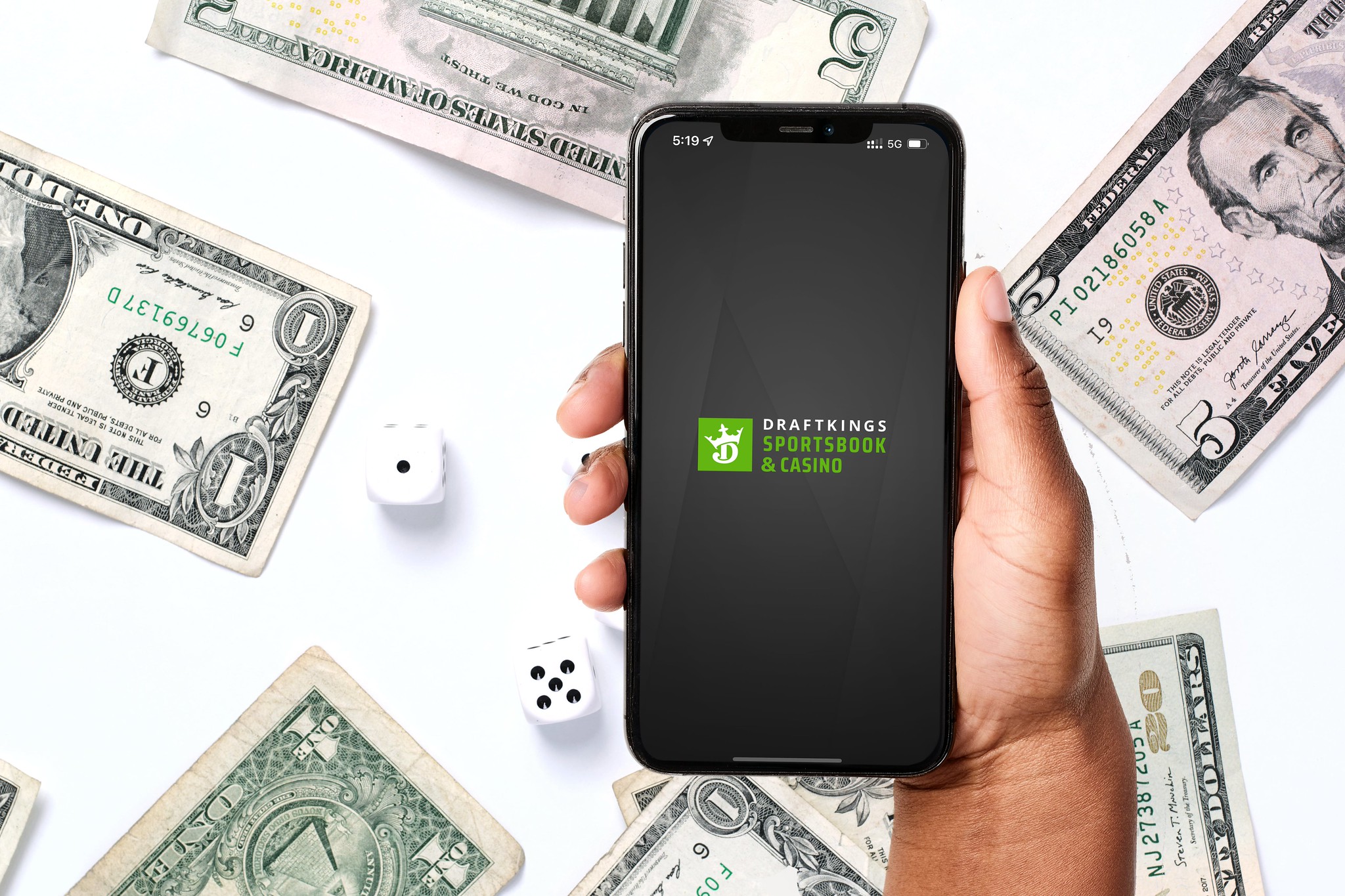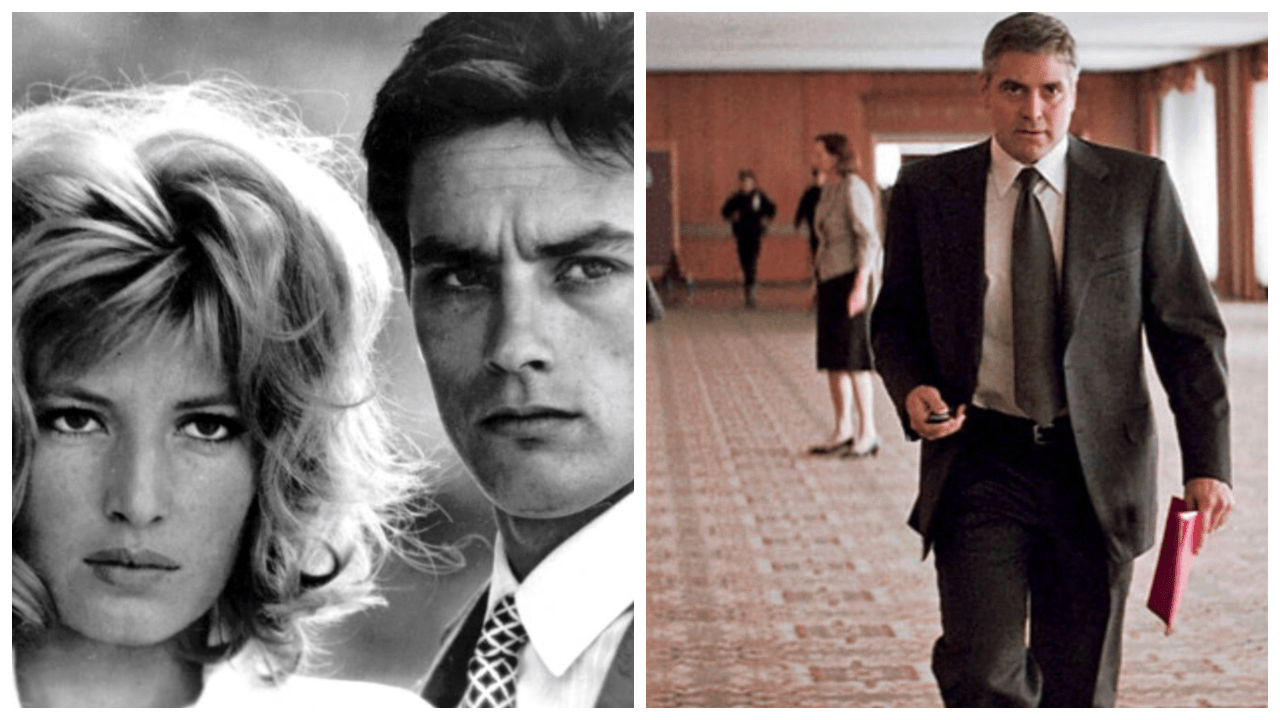As George Floyd Square was reopened to traffic at 38th & Chicago on June 3, members of the Agape Movement stood alongside city employees while they cleared barricades from the street. The group is made up of ex-gang members, many of whom share an intimate connection to GFS. It also has a contract with the city—$40 an hour per worker.
With the Minneapolis Police Department plagued by attrition and distrust, the city has turned to groups like Agape to help diffuse tense situations. Often, they’re made up of Black men wearing matching uniforms—blazing neon vests or T-shirts with their group name—who work with police or Public Works employees. At least seven have contracted with the city for crowd control efforts since spring’s Derek Chauvin trial. They’ve been deployed to keep an eye on protests in Uptown and around the Hennepin County Government Center, and they’ve conducted funeral security in north Minneapolis.
And these so-called community patrol groups have faced harsh criticism from activists and abolitionists.
“We’re past the time of police reform... or policing that can be done with a colored T-shirt instead of a badge” says ML, an abolitionist who co-authored the Field Guide to Twin Cities Collaborators, a zine critical of groups that work alongside law enforcement.
Activist Lavish Mack says the city’s choice to use the groups tears people apart further. “The city said... we're going to dig into your community and pay parts of your community to fuck your own community up.”
Many sources say the groups’ work during protests has been harmful and fomented mistrust, casting doubt on the future of community patrols in Minneapolis.
Who Are They?
The Minneapolis City Council approved two initiatives earlier this year that employ community groups within the city’s Office of Violence Prevention (OVP): community patrols and violence interrupters. These two separate initiatives serve differing purposes. The patrols help with de-escalation and crowd management during protests; violence interrupters use the Cure Violence model to treat violence as a contagious disease in specific areas.
The City Council unanimously approved about $1 million in February for the Chauvin trial community patrol efforts. The allocation was voted on with minimal public discussion beforehand.
The community patrols are new, and the difference between the two initiatives gets easily muddled—especially since some groups perform both community patrol work and violence interruption.
Then, in June, it came to light that Mayor Jacob Frey used COVID-19 emergency funds to extend a contract with Agape Movement outside of OVP that includes some work similar to the community patrols.
Sasha Cotton, the director of OVP, says the community patrol contract was “time-limited,” and only meant for added engagement and security during the Chauvin trial. The Council approved seven groups for this effort, including We Push for Peace, A Mother’s Love, T.O.U.C.H. Outreach, and Change Equals Opportunity, the parent organization of the Minnesota Freedom Fighters.
The U.S. Department of Justice gives community patrols six hours of training as part of its community marshal program, Cotton says. The city picked groups that had already received some de-escalation training and provided them with additional training.
Ward 4 City Council member Phillipe Cunningham has criticized the city’s use of the groups for protest management, but he “deeply supports” the overall work they’re doing. They bring rare and powerful skill sets to the table, he says.
“But we as city leaders have to be very intentional and careful with how we are using those resources,” says Cunningham, who helped lead the push to create OVP. “This is a learning practice with some of the work related to violence prevention.”
While violence interruption work is evidence-based, he says, community patrols are a newer effort with fewer examples to model.
“The challenge was that the two overlapped,” Cunningham says. “The folks who were doing violence interrupter work should not be doing community patrol work.”
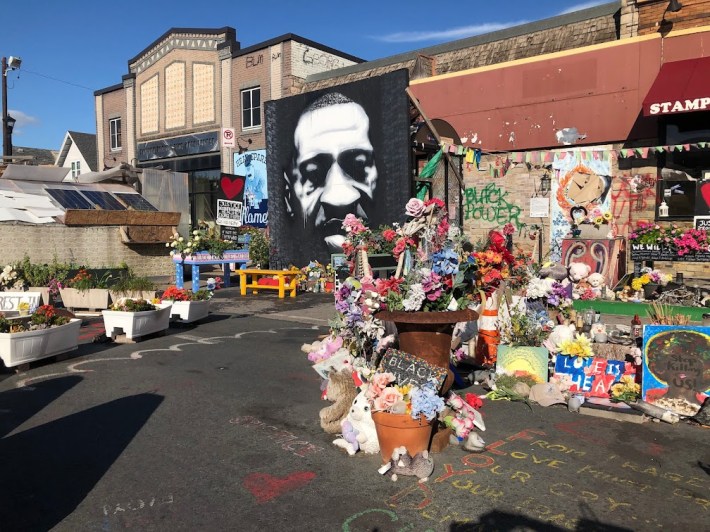
Another Form of Policing?
After Agape and the city cleared the original barriers at GFS, activists worked throughout the morning to restore improvised barricades. In the afternoon, a man wearing an Agape T-shirt exited a truck with a woman and started yelling at the activists on 39th Street.
“Get this shit out of here, because if I come back, you're not gonna like how I get this shit out of here,” he said, according to bystander Quentin Wathum-Ocama.
The apparent Agape member eventually told one volunteer to shut their “gay ass” up, saying he doesn’t talk to gay people. He eventually began squaring up as if he was going to fight, Wathum-Ocama says.
New chants arose around that time at GFS, including: “If you work with the city, you’re a motherfucking piggy.”
Agape’s spokesperson did not make a member available for comment.
“I think it's... offensive and problematic and dangerous, to just have Black faces go out and do this kind of work where there's no accountability,” says Wathum-Ocama, a biracial African- American man. “I know we've been talking about alternatives to policing. This is not what people meant.”
According to Michelle Gross, president of Communities United Against Police Brutality (CUAPB), these types of groups are engaging in conduct the city could not get away with, including “brutalizing people, and really interfering with people's First Amendment rights by proxy.”
It’s complicated to find new responses to community issues, specifically crowd management, that don’t involve police, Cunningham says.
Policing relies on compliance, he says, and can ultimately lead to escalation if there’s noncompliance. He hopes to see more work that follows the model of Nonviolent Peaceforce, a group of unarmed people who protect civilians against state violence and bad actors in places like Iraq, Myanmar, and even the Twin Cities.
Abolition is about creating systems that serve the needs of people and dealing with all kinds of violence, like issues related to addiction or poverty, according to the abolitionist ML. She says the groups never had community trust when it comes to policing.
“Handle the issues that led to the protest,” she says. “While they’re called the Office of Violence Prevention, they have no intention of preventing violence that comes from the state toward the people.”
Sheila Nezhad, mayoral candidate and policy analyst with Reclaim the Block, which seeks alternatives to policing, says explicit requirements need to be put in place that community groups don’t work with police. She says the city needs to invest more in training and maintaining transparency about who’s in the groups and how they’re funded.
“There's a difference between ‘sworn police officer’ and the act of policing people,” Nezhad says. “In that regard, we are still seeing policing happen. It's just through a different channel.”
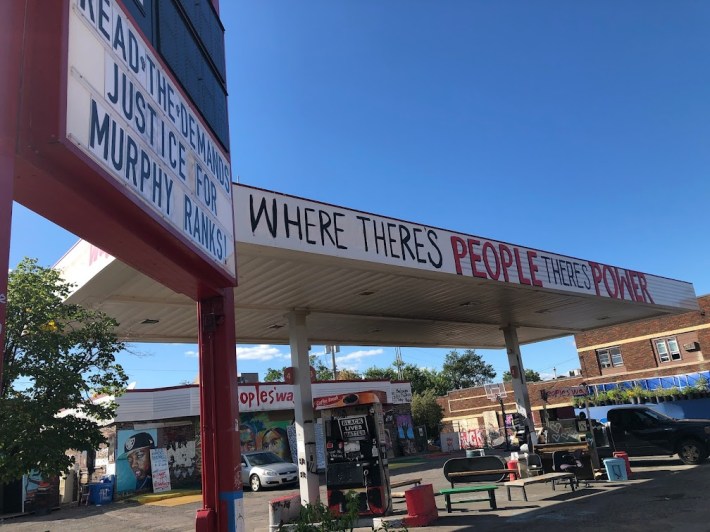
Looking Ahead
Cotton says OVP welcomes and considers criticism, and she hopes the office can create initiatives that are valuable and valid to Minneapolis residents. She notes that some community members will never support community patrol efforts, but the city can’t “subscribe to fitting into that narrative.”
It’s also not realistic to compare OVP, which was founded in 2019, to the 150-year-old police department, she says. She hopes for some “grace” as her office figures out what works and what doesn’t. “We aren't going to get it right every single time with the first rollout of something,” Cotton says.
She says it’s up to the City Council whether community patrols are utilized again. But some activists think trust can’t be rebuilt.
“The city is so far gone, bro,” Mack says.
Within an hour after a federal task force killed Winston Smith in Uptown on June 3, Mack says, members of A Mother’s Love and We Push for Peace were telling the small contingent of activists to not yell at police and that their “anger was misguided.”
“A Mother's Love is up here getting cold Gatorades from the police... but y'all work for the people? How sick are you?” Mack says.
CUAPB’s Gross says trust can’t be restored unless accountability is put in place. Currently, the groups aren’t adequately held accountable, she says.
“If you have accountability, trust will create itself,” she says. “We're not going to sit down and have frickin’ Kumbaya meetings with the cops or their extensions.”
When complaints come in, Cotton says the city first reaches out to leadership within the community groups to ask about alleged misconduct. Sometimes the city will suggest further training, sometimes the group will internally dismiss or discipline the person who committed misconduct. The city can terminate a group's contract at any time for any reason, Cotton says.
With OVP, Cotton hopes to see the city targeting root causes of violence. Activists and abolitionists have said the same.
“We believe our work is having an impact and we believe the data leads us down that path,” Cotton says. “But we really want to get to the root causes in the future.”
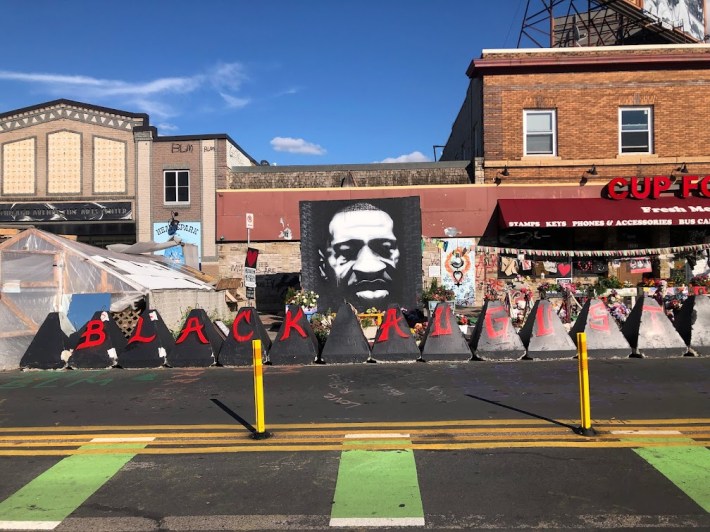
Uptown and Beyond
A man known as Six, who’s a member of We Push for Peace, says his group provides important services. On the morning of August 3, he says, they intervened with a teenage girl who was considering suicide. He says George Floyd might have lived if a community patrol member was there to de-escalate the situation.
“We’re trying to intervene before the police have to be called,” Six says. “[We’re] policing our own community, so if they categorize us as police in that sense, then so be it. But would you rather have us there? Or would you rather have Minneapolis there and you get shot in your ass?”
We Push for Peace has various programs to help people step into the labor force, Six says. Members of the group say that while they work in conjunction with police, they are “in no way” the police. Nearly all of them have previously been incarcerated.
They help people, but “get looked at and frowned upon,” Six says.
Two months after Winston Smith was killed, Courtney Paris stood in protest among a group of about 20 near the Uptown parking garage where he died. Six and a couple other We Push for Peace members watched from across the street.
She says she appreciates that the groups do targeted violence intervention, but asks “What are [they] doing here?”
“If y'all are so worried about the Northside and not worried about Winston [Smith], go over there,” Paris says. “Don't come here to shut down a protest that you're not for.”
Just two days prior, Gross led a CUAPB protest outside that same Uptown parking garage, which had been locked down behind barricades and outfitted with an armed private security force. Gross says the city has considered a growing list of promises for changes to policing in recent years, though she’s unconvinced community patrols are the answer.
“Even before George Floyd got killed,” Gross says, “there were a hundred things they could have done and they chose not to do a single one of them.”
